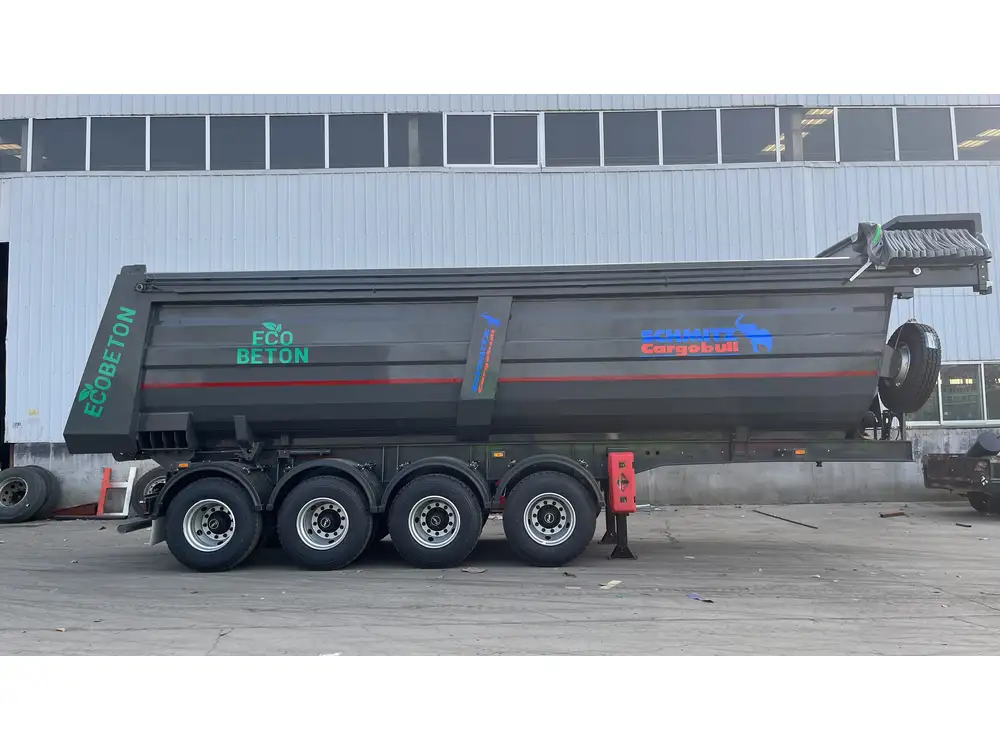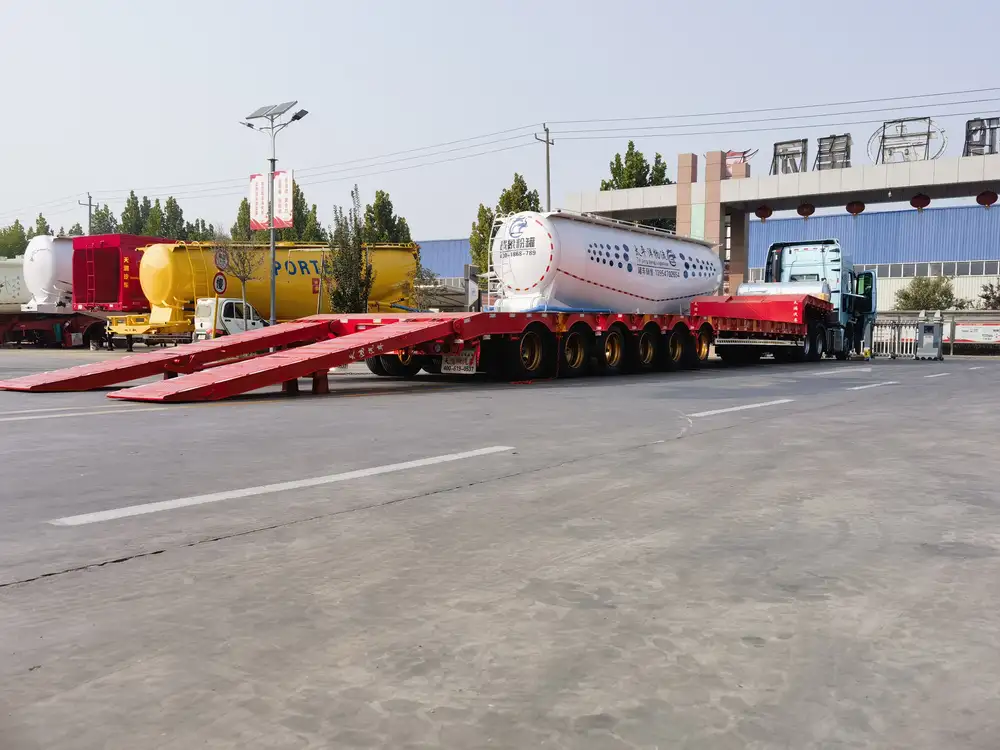Introduction: The Importance of Skeletal Container Trailers in Logistics
In the complex world of logistics and transportation, skeletal container trailers play a crucial role. Designed to efficiently transport containerized cargo, they offer flexibility and convenience for freight forwarding, shipping lines, and logistics providers. Understanding the market for these trailers, specifically their pricing structures, is vital for making informed purchasing decisions.
What is a Skeletal Container Trailer?
A skeletal container trailer is a specialized type of trailer designed specifically for carrying intermodal containers. Featuring a lightweight frame and a minimalistic design, these trailers provide the necessary strength and stability while ensuring weight efficiency. The skeletal design allows for easy loading and unloading of containers, making them ideal for quick operations and rapid turnaround times.

Key Features of Skeletal Container Trailers
| Feature | Description |
|---|---|
| Lightweight Frame | Constructed with high-strength steel, these trailers are designed to minimize weight without sacrificing durability. |
| Versatility | Capable of accommodating various container sizes (20ft, 40ft, etc.), skeletal trailers adapt to diverse transportation needs. |
| Low Profile Design | The low height allows for improved aerodynamics and easier loading, especially in terminal settings. |
| Durability | Built to withstand harsh weather and road conditions, ensuring a long lifespan with minimal maintenance. |
| Easy Maneuverability | Shortened length and optimized design facilitate tight turns and easier navigation in crowded urban environments. |
Analyzing the Factors Influencing Pricing
Understanding the pricing of skeletal container trailers requires a multifaceted approach. The factors influencing prices include:
1. Material Quality and Type
The materials used in the construction of skeletal trailers greatly affect their cost. High-strength steel and aluminum are common choices due to their durability and lightweight properties but come at a premium price.

2. Trailer Size and Capacity
Larger trailers typically command higher prices. A 40ft skeletal container trailer, for instance, may cost more than a 20ft model due to the additional materials and engineering required.
3. Manufacturer Reputation
Brand reputation plays a significant role in trailer pricing. Established manufacturers with a history of reliability and quality often charge higher prices due to their proven track records.
4. Customization Options
Customization can inflate the base price significantly. Buyers may opt for additional features, such as enhanced suspensions, specific paint jobs, or advanced braking systems.

5. Market Demand and Economic Conditions
The law of supply and demand influences prices significantly. During peak logistics seasons or economic booms, prices can rise due to increased demand for trailers.
6. Geographic Location
Regional market conditions can affect pricing, with certain areas experiencing higher transportation costs that could translate to elevated trailer prices.
7. Warranties and Service Agreements
Trailers that come with extensive warranties or service agreements may carry a higher upfront cost, but they can provide long-term savings and peace of mind.

Current Market Price Ranges for Skeletal Container Trailers
The prices of skeletal container trailers can vary significantly based on the aforementioned factors. Here’s a comparative analysis for prospective buyers:
| Trailer Type | Average Price Range (USD) |
|---|---|
| 20ft Skeletal Trailer | $8,000 – $15,000 |
| 40ft Skeletal Trailer | $12,000 – $25,000 |
| Customized Trailers | $15,000 – $30,000+ |
| Used Skeletal Trailers | $5,000 – $12,000 |
Understanding the Price Breakdown
To dissect the pricing further, consider a hypothetical 40ft skeletal container trailer priced at $20,000. The breakdown can reveal crucial insights:
- Material Costs: $8,000 (high-strength steel frame and components)
- Labor Costs: $4,000 (manufacturing and assembly)
- Overhead Costs: $3,000 (facility maintenance, utilities)
- Marketing and Distribution: $2,000 (advertising, shipping)
- Profit Margin: $3,000 (manufacturer profit)
This breakdown reveals how different cost components come together to form the final price, enabling potential buyers to appreciate the economic structure at play.
Tips for Finding the Best Deals on Skeletal Container Trailers
Navigating the market for skeletal container trailers can be challenging. Here are actionable tips to secure the best deals:

1. Conduct Thorough Research
Leverage online platforms and forums dedicated to transportation and logistics. Reading user reviews and customer experiences can provide valuable insights.
2. Compare Multiple Manufacturers
Compile a list of reputable manufacturers and get quotes for similar models. Each manufacturer may offer different pricing and financial incentives.
3. Explore Financing Options
Investigate financing solutions provided by manufacturers. Many offer payment plans or leasing options which can ease the financial burden.

4. Attend Trade Shows and Expositions
Industry events often showcase various manufacturers and their offerings. Engaging directly with companies can yield significant savings through exclusive trade show discounts.
5. Consider Used Trailers
Purchasing used skeletal container trailers can result in substantial savings. Ensure to review the condition and maintenance history before making a decision.
6. Negotiate
Don’t shy away from negotiating the price. Manufacturers often have wiggle room and accommodating customer needs is a key aspect of their business.

Frequently Asked Questions (FAQs) about Skeletal Container Trailers
What is the typical lifespan of a skeletal container trailer?
With proper maintenance, a well-built skeletal container trailer can last anywhere from 10 to 15 years or more, depending on usage and environmental conditions.
Are skeletal container trailers suitable for all types of cargo?
While primarily designed for intermodal containers, skeletal trailers can also transport other types of cargo, provided the haul meets weight restrictions and regulations.

How much maintenance do these trailers require?
Regular maintenance includes checking brakes, tires, and frame integrity. A maintenance schedule can extend the trailer’s lifespan and ensure optimal performance.
Where can I find reputable manufacturers?
Start with online research, industry publications, and recommendations from logistics professionals to identify recognized manufacturers and their offerings.
Can I customize my skeletal container trailer?
Yes, many manufacturers offer customization options, including unique frame enhancements, suspension systems, and more based on individual needs.

Conclusion: Making an Informed Decision
Investing in a skeletal container trailer is a significant decision that can lead to improved logistics efficiency and profitability. By understanding the price dynamics, conducting thorough research, and considering the influencing factors outlined in this guide, potential buyers can make informed choices aligned with their operational needs. With the right trailer, logistics operations can run smoother, enhancing delivery timelines and contributing to overall business success.
This comprehensive exploration of skeletal container trailers and their pricing aims to empower businesses, ensuring they thrive in a competitive logistics landscape.



